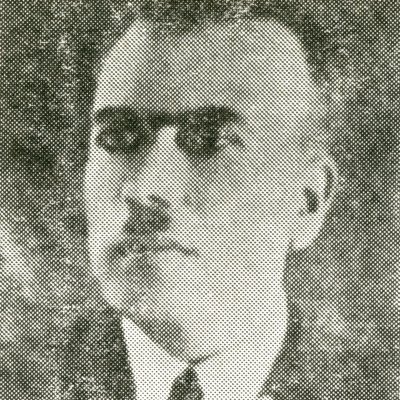
Issa al-Sifri
عيسى السفري
Issa al-Sifri was born in in the city of Ramla to a Greek Orthodox Christian family. His father’s name was Rufa. He married Victoria al-Sifri and had three daughters—May, Nuha, and Dumya—and one son, Sari.
Sifri received his primary education in Ramla and then went to preparatory and high school in Jaffa. He worked as a teacher for a number of years in the Jaffa Secondary School, during which he came to be known as an exemplar of the competent, conscientious educator who trained his pupils to be self-reliant and to confront whatever hardships and calamities came their way with confidence, determination, and conviction. His methods of teaching left a tangible impact on his students.
In 1929, Sifri, his students, and other teachers from Jaffa Secondary went on a visit to Amman, where they were received by Abdallah ibn al-Hussein, emir of Transjordan in Raghadan Palace.
Sifri rose to prominence as a patriotic writer and man of letters. He called for fighting the British Mandate and Zionism, and gave up his government job, which was his source of livelihood, out of commitment to the defense of his homeland Palestine.
In the mid-1930s, Sifri published a number of articles in the newspapers al-Difaaʿ [Defense] and al-Sirat [The Path]. Then he joined the editorial board of the newspaper Filastin, which had been founded by Isa al-Isa in Jaffa in 1911. On its pages he devoted himself to writing comprehensive articles defending Palestine and its Arab people from the threat of Zionist ambitions and from the repression and tyranny of the Mandate authorities. He called for fighting against the British Mandate and Zionism and alerted Palestinians to remain on guard against their schemes.
In 1935, Issa al-Sifri founded a library in Jaffa called the New Palestine Bookshop and then attached to it a commercial printing press. His bookshop became a meeting venue for writers and literary scholars in the city, which contributed to deepening political awareness among Palestinians.
The British authorities arrested him in 1937 for his nationalist activity and detained him at Mazra‘at Akka prison, where he spent three months. After his release, he resumed his activities against Zionists and colonizers.
After leaving the newspaper Filastin, Sifri continued to write in Palestinian and other Arab newspapers and magazines, including the magazine al-Minbar [The Podium], published by the Union of Arab Orthodox Clubs, and the Cairo-based magazine al-Risala [The Message], remaining steadfast in spite of the imminent danger surrounding him.
After the Nakba in 1948, Sifri moved to Jordan, where he settled with his family in the city of al-Salt. Then, at the beginning of 1949, he moved to Amman and resumed working as an editor with Filastin, during the period in which the newspaper was based in the Jordanian capital. With this, he carried on his struggle to give voice to the tribulations of his people after the Nakba.
Sifri passed away on the night of 19 March 1949, while he was hard at work at the Filastin office in Amman, following a severe heart attack, perhaps brought on by the realization that he would not be allowed to return to Palestine for the rest of his life. He was buried in one of Amman’s cemeteries. In Ramallah, a street was named after him.
Issa al-Sifri was a historian and journalist and one of Jaffa’s eminent writers. He worked in education, the media, and the social and cultural fields, and he was part of the Palestinian national and pan-Arabist struggle. He was also the first to publish a rigorous scholarly history of the British Mandate over Palestine in Arabic. The first part of this publication covers the history of the cause of Arab Palestine, from the British occupation of Palestine in 1917 until the outbreak of the Great Arab Revolt of April in 1936. The second part covers the history of the revolt, its causes, chronology, and outcomes until the advent of the Royal Commission of Inquiry headed by Lord Peel.
Selected Writings
"رسالتي" (مجموعة مقالات في الأدب والفن والاجتماع). يافا: مطبعة مكتبة فلسطين الجديدة، 1937.
[My Message (a set of articles on literature, art and society)]
"فلسطين العربية بين الانتداب والصهيونية: سجل حافل بدقائق القضية الفلسطينية في عشرين سنة"، كتابان في مجلد واحد، يافا، مطبعة مكتبة فلسطين الجديدة، 1937.
[Arab Palestine between the Mandate and Zionism: A Record Replete with the Minutiae of the Palestinian Cause for Twenty Years]
"دماء ودموع"، يافا، مطبعة مكتبة فلسطين الجديدة، 1947.
[Blood and Tears]
Sources
Abdul Hadi, Mahdi, ed. Palestinian Personalities: A Biographic Dictionary. 2nd ed., revised and updated. Jerusalem: Passia Publication, 2006.
حسن، شاكر فريد، "من أعلام الفكر والثقافة في فلسطين. عيسى السفري (1894-1949)"، "الاتحاد"، حيفا، 5 نيسان/أبريل 1988.
العودات، يعقوب، "من أعلام الفكر والأدب في فلسطين"، عمّان، د. ن. ، 1976.
"الموسوعة الفلسطينية"، القسم العام في أربعة مجلدات، المجلد الثالث، 1984.
نويهض، عجاج، "رجال من فلسطين كما عرفتهم" (جمع وتصنيف بيان نويهض الحوت)، بيروت، مؤسسة الدراسات الفلسطينية، 2023.